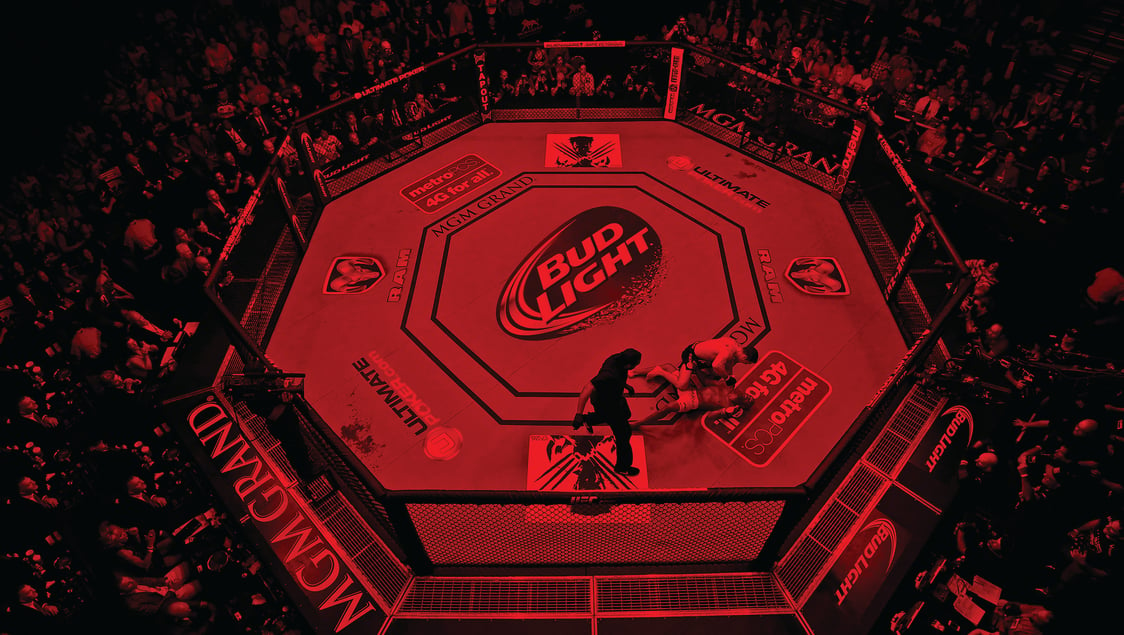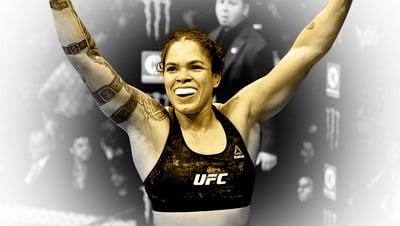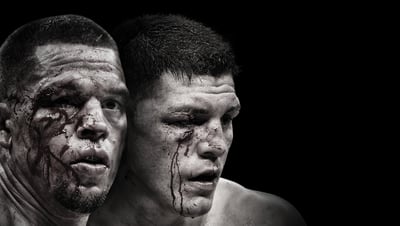
Issue 172
November 2018
Why do some fighters freeze while others flourish? What part does mental strength play in overcoming opponents? Does the mind really rule the body?
Anderson Silva was impervious, a genius. Seemingly unbeatable. He was on an 18-fight winning streak and he strode to the Octagon smiling, in Las Vegas, to face Chris Weidman, a tough New Jersey guy 9-0 in his career, who was seen as the underdog. It was 2013. Weidman was in the arena, having walked in to Tom Petty’s ‘Won’t Back Down’. It was an omen, a sign.
We all know what happened next. Silva played his taunting act. Got caught, dropped, and finished.

Brazilian fans vented their anger at Silva’s antics, antics that had worked so many times before, even beaten opponents before they stepped in to challenge one of the greatest finishers of all time.
Mindset. We all have one. Our fighting heroes have one. But how it is employed, for better or for worse, and at the right time, often dictates our destination. And how we get there. They say fighting is 95 percent mental, five percent physical. Not strictly true. But the ways mindset can win – and lose – a fight are deeply nuanced.
Mindset comes in many forms and guises.
You only have to pluck examples like that of Silva at UFC 162 from a panoply of broken dreams. And mindsets. There was a time when Silva’s mindset, allied with the knockout armory, and skillset both standing and grappling, created an aura which made him seemingly invincible. Over time, it became an illusion, then a parody, which exposed his mindset weaknesses. Or, perhaps a stronger mindset in his nemesis Weidman, who shattered the mirror, destroyed the winning run.
Silva’s japery, his taunting that night, was wrong. Wrong tactic, wrong opponent, wrong time.
But there was a time, watching Silva live, for example, when it was electrifying because every move he made was the right move. In that sense, mindset is about a choice.
The same can be said right now of Conor McGregor, in the way in which he ‘broke’ Jose Aldo, the brilliant featherweight king.
McGregor’s unbreakable mindset unhinged Aldo, and led to those scenes after the knockout in 13 seconds in December 2015, though the Irishman’s absence from the sport for almost two years may have changed something. But there are ways of studying mindset, and it is becoming ever more interesting.
Psychoneuroimmunology (PNI) is one of the newest studies affecting the mindset of fighters, for example. Sports psychologists reckon that there are ways it can affect fighters and how they have ‘purple periods’ when mind and body are impervious to defeat.
PNI is actually a medical study of the interaction between psychological processes and the nervous and immune systems of the human body, and is now being used by sports psychologists to interpret just how effective fighters can be with their mindset, their set of beliefs, and how the body responds. But they must be in harmony.
It really is a science, taking in aspects of neuroscience, physiology, genetics, molecular biology, and psychiatry. In its simplest terms, this is about how we project ourselves, both externally, and inside our systems, our own bodies. Or down to the core, our cells. The one relates to the other, drives the other internally and externally. And with it, comes success.
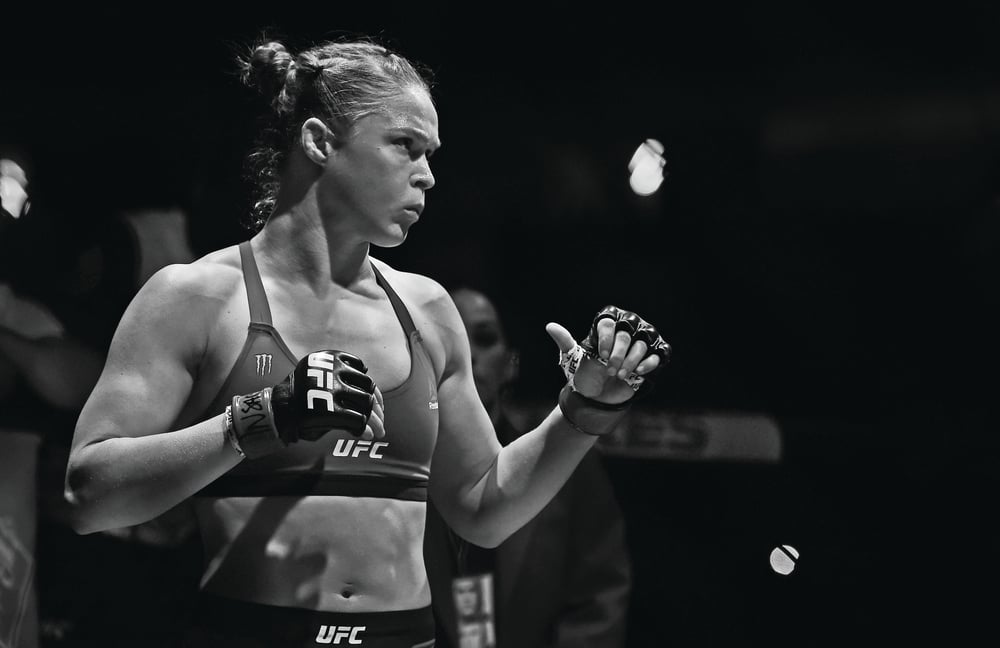
Look back through recent years, and the likes of McGregor, Silva, Weidman, Ronda Rousey in women’s MMA as a pioneer, Michael Bisping, Chael Sonnen and latterly Ilima-Lei Macfarlane, Henry Cejudo, TJ Dillashaw, Robert Whittaker and even Darren Till have employed a mindset which works for them, and can put rivals in the shade.
Further back, we might even study Fedor Emilianenko, the brilliant Russian heavyweight, who reigned for a period defying logic. Think how often the UFC heavyweight title changes hands today.
Jason Parillo, the striking coach for Bisping, and the man credited with engineering how the British fighter should attack Luke Rockhold that night when the Lancashire fighter took the UFC middleweight crown, says he could “talk about ‘mindset’ for days”. Parillo’s approach to mindset clearly created the perfect storm with Bisping, who felt like a champion, but had to maintain his confidence through a series of eliminator fights for the title – which he lost.
“Mindset is everything. You have the skill set with these very elite fighters, but you just can’t have a great mindset to get to the very top level,” Parillo explains.
Only from his base in Los Angeles. “What separates the guys at the top of the food chain is the two things allied. I really could go on talking about this for days but it really is everything. I see guys break the week of the fight, see guys who are world beaters in the gym. They beat the ass off great fighters in the gym but just can’t replicate it when the time comes to fight in the arena.”
Bisping, he says, was always destined to become a UFC champion because of his mental attitude. “Mike’s mental toughness and determination were big factors in him winning the title. For me, his mind was struggling to catch up with his body. The mind is moving a million miles ahead. His mind and body were not connected. I told him when I started working with him. We can’t be frantic at the top, it all has to be done with calmness, a mind/body connection.
“Mike is a guy who has all the skill set, the experience,” Parillo continues. “But there was no direction at times, he needed to be calm, to be present in the moment.”
And of course that’s exactly what we saw the night the greatest British mixed martial artist knocked out Rockhold to claim the belt. Parillo agrees, as did Bisping afterwards, that he was even relaxed for the fight, as he had less than three weeks to prepare.
Bisping knew that he had to take his chance, and mind and body were in synch. It came down to mindset.
Brian McCready, a sports psychologist who has worked with boxers and mixed martial artists is an advocate of PNI.
“The expression ‘mindset’ is often misunderstood,” explains the English psych who has recently been working with the Liverpool-based UFC fighter Darren Till. “There are actually only two mindsets. One we call ‘a moving mindset’ and two, ‘a fixed mindset’. The ‘moving mindset’ is the one needed in this sport.”
The ‘fixed mindset’ is the person who works 9 to 5, and accepts it, he explains. “The other mindset is a creator who wants to achieve like fighters. They are just driven, and often they don’t know where it comes from. That why when they finish, they don’t know what to do.”
“The greatest fighters have moving mindsets, they can create mental imagery, like Muhammad Ali did, like McGregor clearly does.”
With Bisping, explains McCready, something developed in his mindset over time. “If you throw your mind over the bar, the rest will follow. His body followed his mind. If you keep saying something, it will happen. Bisping had that cocky attitude, his internal voice was speaking to him, he kept nagging at the self, the soul, the spirit of the fighter, and it will always prevail.”

So is that true for McGregor?
“Absolutely. He has a cast-iron mindset that conquest will be his. He truly believes it. I don’t think many other people can do that. He sees things clearly: he says it, he believes it.
"The thing is a lot of people say it, but they don’t believe it. It’s like allowing trillions of cells in the mind and body that are waiting for that message, to respond. The membranes, the mood, feelings, they are like a nutrient.
"If you want to be the best, the greatest, the cells get the messages and nothing can stop you. It’s like an energy you have.”
But what about the other way round? The mindset that espouses overconfidence, perhaps borne of lack of focus, or a fighter becoming a parody of himself?
Like ‘Spider’ Silva. Parillo has a view on this. “If you are overconfident, there is a lack of focus. You can’t disrespect the fight game. When a fighter goes in there and tries to fuck around, it can backfire. Weidman was determined, was going in there to win or lose, and didn’t care who Silva was, while Silva had the mindset of ‘I’m the Greatest on Earth’ and it all came crashing down around him.
"What we can’t ever forget is the guy opposite you is going to be a very high-level fighter. Sometimes you see guys just break the lock.” That’s what Weidman did. It was down to his mindset, ignoring the aura of Silva and knowing he had the tools, mentally and physically, to take the prize from a sporting legend.
Similarly, Ronda Rousey blazed a trail of invincibility, yet began to believe in her striking, rather than her grappling, which had defeated all-comers.
Rousey’s mindset changed from an ironclad technical and mental plan, to ‘believing’ that she was, as UFC president Dana White dubbed the pioneer, ‘the Mike Tyson of women’s MMA’. In short, Rousey’s mindset was that she then believed in the hype around her. Or that’s how it seemed.
That’s where the corner, the training team becomes so vital in maintaining and nurturing the mindset of their fighter...
McCready weighs in on what went wrong with Silva. “It was almost as if he hadn’t read the script, his mind hadn’t assessed properly what was in front of him. He was fooling around, his mind was fuzzy, then there is age, wear and tear, and he might have become a parody of someone who has a mindset.’
Interpose the PNI cycle on McGregor, suggests McCready and he was a living, breathing example of the scientific mind/body system at work.
“McGregor walks into a room like he owns the place. To the point where they are tunnel-visioned, ignore friends, change as they project themselves.”
We shouldn’t think, of course, this is just about fighters. “I heard a story from someone about Tiger Woods. They were traveling together to a golf course in a car, and Woods was cracking jokes, was brilliant company, and great fun, but when he drove through the gates of a golf course, a veil came over him, he changed. It’s programming those with a great mindset about winning, about being the best, automatically have.”

Mindsets can be switched on and off, too. Scott Coker, president of Bellator MMA, sees a change come over Chael Sonnen, which is almost like an alter ego. Indeed, I’ve experienced this myself working on air on television with Sonnen.
“Chael becomes Superman. If you talk to this guy off-camera, you don’t even recognize him. He’s another guy,” explains Coker.
“He’s like Clark Kent. Once he starts talking and gets into that mode, into that character, it’s almost like it’s that character who is the fighter. You take him away from that and he’s a completely different guy. The mindset is key because it sets the whole tone for everything. For the fight, the training, the sparring and ultimately the outcome.”
Perhaps in the same vein, there is Fedor Emilianenko, though his method is completely different. There is not a semblance of emotion at winning, or losing. He treats the two imposters the same.
“He’s been to me the greatest heavyweight of all time, maybe the greatest martial arts fighter in the history of the sport,” says Coker who knows the Russian well and currently has the legend under contract at Bellator. “And still to do what he’s doing today at this level is pretty incredible. I went to see him train in the Netherlands. To see him walk into the gym, he just has a different look on his face. He looks like a different person.
"It’s almost like a character in a movie. The mask was on when I walked into that gym. He had that master’s mindset, that killer’s mindset. It’s time to go to work and time to destroy. He’s a dangerous guy. He’s fun to hang out with and he’s very funny. But you say something wrong or someone annoys him, this cloak comes over him and he becomes the assassin.”
A mindset can also be ‘developed’. Wrestling coach Eric Albarracin, who has worked with the Nogueira brothers and the Pitbull brothers, says that happened with Cejudo, and other team members, as they prepared the former Olympic wrestling champion for his second contest with long-reigning UFC flyweight champion Demetrious Johnson. They sharpened his mind as they would drill a jab, or get positionally correct for the takedown. His mindset was everything in getting a close-run victory in August this year.
“Henry’s belief in himself has always been the X factor, even when he went to the Olympics,” Albarracin reasons.
“He was the underdog. He was ranked 31st in the world, he fought a world champion first round, who had beaten him before. But he beat him at the Olympics, the biggest stage in the world.” What they did was re-train that mindset into Cejudo in camp ahead of fighting ‘Mighty Mouse’ Johnson, who had knocked him out first time around. When he stepped in there he knew he would win by sticking to his game plan. Utter belief.
“That Olympic experience helped with the mind, and transferred into another sport,” adds Albarracin. “That was the difference. Henry had already been there. He has had that experience and he knew in his mind, that he could do it...”
“For me, that element of mindset it about ‘honesty’,” says Cejudo himself. “Honesty with yourself, honesty about the situation you are going into. I knew I was going up against the pound-for-pound guy and the guy who knocked me out first time round. I wasn’t faking it until I made it, I was facing the problem head on. Embracing it.”
Albarracin adds: “The funny thing is, that people were all saying Henry is bigger than DJ, but when they did the weigh-ins on the day of the fight, DJ weighed more than him. But Henry was unaffected by it, he just knew he would be stronger. We had trained that mindset.”
Parillo again. He concurs completely that mindset can be tailored to an individual fighter’s need, how they operate, what smooths their passage to victory, and takes them into the arena, with their nerves locked in one box, and their mind and body in harmony to react in the moment. What works for some fighters, of course, does not work for others.
“I see some coaches and trainers who are so technical, do certain things certain ways, ask for constant adjustments. But then I was watching Big Country [Roy Nelson] warm up a couple of years ago, he looked off balance, he doesn’t look like an athlete, but he is a pro fighter. He walked out there and he knocked out [Antonio Rodrigo] Nogueira. He was relaxed, calm, confident... that’s also mindset right there. And it’s one of his weapons.”

Ditto Phil De Fries, the UK heavyweight who had a period in the UFC but always seemed to be suffering from the jitters. He went 2-3 in his UFC career. But using ‘mood boards’ at home and in the gym to get over anxiety, he changed his mindset.
Now 3-0 in his last three contests, he took the KSW heavyweight belt over Michal Andryszak in Poland in April this year. “I’m a calm fighter with no anxiety now, and it’s onwards and upwards,” says De Fries.
What De Fries now appears to have correlates with what sports psychologist David Mullins, based in Ireland, likes to see his fighters have: freedom.
“The mindset I want my fighter to be in, come fight time, is one of freedom. Freedom to perform in the moment that counts,” says Mullins, who has worked with McGregor.
“To get to be free in there we work on being honest about the things that can cause distraction – like the result of the last fight, what the opponent said in the build-up, personal life stuff.”
That applies to Ilima-Lei Macfarlane, the Bellator flyweight champion, who went from being an overweight undergraduate student who was drinking too much, to a world-beater in three years. “My mindset is ‘realistic’ and allows me to stay grounded in the sport. You can 100% develop a mindset,” says the 28-year-old fighter.
“I’ve been working with a sports psychologist since the beginning of my career with Bellator and every fight I feel more mentally sound. I don’t have that killer mindset that a lot of fighters like McGregor and Bisping have, but I do have a mindset that works for me.
"My mindset is that in this sport, anything can happen. So stay calm, stick to the game plan, and never be under the illusion that I am the best because I’m not. Anyone can beat me on any given day.”
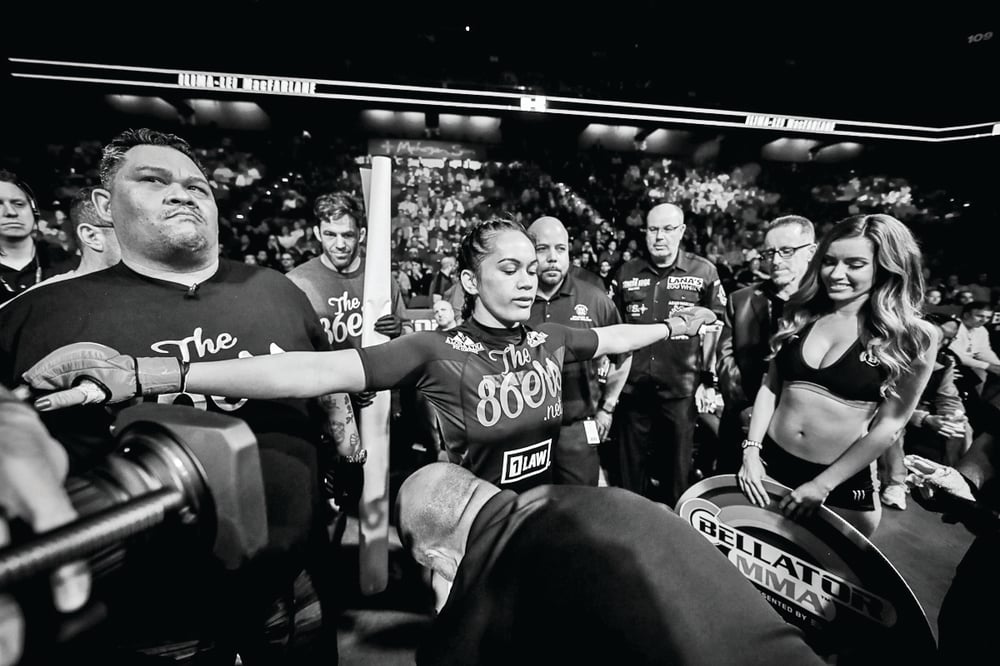
For promoter Coker, mindset is indeed everything. “It’s number one. You have to believe you’re going to win because that dictates everything. It dictates your training, it dictates your belief system, whether you’ll be victorious or not. Anything can happen in a fight but it all starts with that mindset.
"My martial arts instructor always said to me, you have to have the master’s mindset. To set that goal and always believe you can achieve it. A prizefighter at the highest level better have a strong mindset.”
But Coker agrees that fighters do lose sometimes because of mindset. “It’s a very fine line. When you think about Cassius Clay or Muhammad Ali, he believed in talking and repeating those amazing sayings he created and all his predictions. He was creating positive affirmation about predicting his outcome. You say that enough times you’re going to start believing it.
“There’s that saying that ‘you become your thoughts’,” he continues. “The law of attraction, you attract what you’re thinking. If you have a negative mindset going into a fight, you may have a negative outcome.
"If you have a positive thought process going into a fight and if you can visualize it, you have a good chance to bring it home.”
Just like McCready in the realm of psychology, Mullins has experienced better performances from fighters who go through those ‘mind’ preparations. “Honesty about those issues and more specific to the individual, plus hard work in preparation, means the fighter can be ‘free’. It’s also important to understand that self-confidence is something you earn via hard work. It helps to remove the notion of hoping you ‘show up’ when it counts.”
“Instead, performance becomes a decision. So you are ready to express yourself fully and can trust yourself to do so.
"We saw great examples of that recently with fighters like Cejudo, McGregor, Dillashaw, and Whittaker. There is no secret techniques for the mind. There is just hard work and understanding your role in your performance.”
Sounds so simple. Yet mindset remains the most complicated area for any fighter. A fine line between winning and losing.
...
